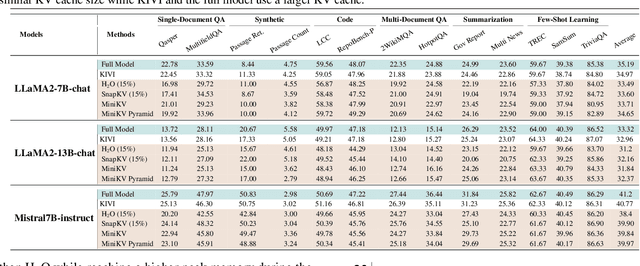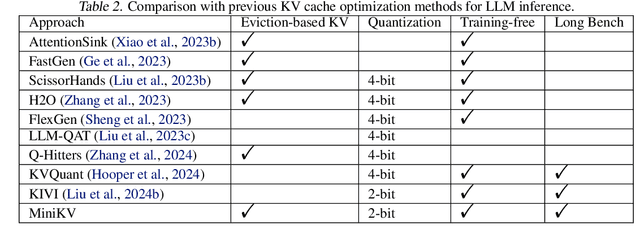Neel Dani
MiniKV: Pushing the Limits of LLM Inference via 2-Bit Layer-Discriminative KV Cache
Nov 28, 2024



Abstract:How to efficiently serve LLMs in practice has become exceptionally challenging due to their prohibitive memory and computation requirements. In this study, we investigate optimizing the KV cache, whose memory footprint poses a critical bottleneck in LLM inference, especially when dealing with long context tasks. To tackle the challenge, we introduce MiniKV, a KV cache optimization method that simultaneously preserves long context task accuracy while significantly reducing KV cache size via a novel 2-bit layer-discriminative KV cache. More importantly, we develop specialized CUDA kernels to make MiniKV compatible with FlashAttention. Experiments on a wide range of long context tasks show that MiniKV effectively achieves 86% KV cache compression ratio while recovering over 98.5% of accuracy, outperforming state-of-the-art methods while achieving excellent measured system performance improvements.
Pushing the Limits of LLM Inference via 2-Bit Layer-Discriminative KV Cache
Nov 27, 2024



Abstract:How to efficiently serve LLMs in practice has become exceptionally challenging due to their prohibitive memory and computation requirements. In this study, we investigate optimizing the KV cache, whose memory footprint poses a critical bottleneck in LLM inference, especially when dealing with long context tasks. To tackle the challenge, we introduce MiniKV, a KV cache optimization method that simultaneously preserves long context task accuracy while significantly reducing KV cache size via a novel 2-bit layer-discriminative KV cache. More importantly, we develop specialized CUDA kernels to make MiniKV compatible with FlashAttention. Experiments on a wide range of long context tasks show that MiniKV effectively achieves 86% KV cache compression ratio while recovering over 98.5% of accuracy, outperforming state-of-the-art methods while achieving excellent measured system performance improvements.
 Add to Chrome
Add to Chrome Add to Firefox
Add to Firefox Add to Edge
Add to Edge